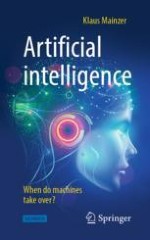2020 | OriginalPaper | Chapter
5. Computers Learn to Speak
Author : Klaus Mainzer
Published in: Artificial intelligence - When do machines take over?
Publisher: Springer Berlin Heidelberg
Activate our intelligent search to find suitable subject content or patents.
Select sections of text to find matching patents with Artificial Intelligence. powered by
Select sections of text to find additional relevant content using AI-assisted search. powered by
